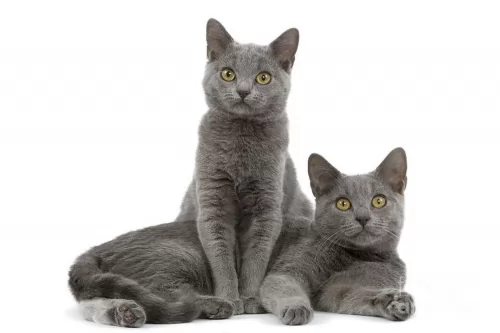 Petzlover
Petzlover Chartreux is originated from France but Thai is originated from Thailand. Both Chartreux and Thai are having almost same weight. Chartreux may live 5 years less than Thai. Both Chartreux and Thai has same litter size. Chartreux requires Moderate Maintenance. But Thai requires Low Maintenance
Chartreux is originated from France but Thai is originated from Thailand. Both Chartreux and Thai are having almost same weight. Chartreux may live 5 years less than Thai. Both Chartreux and Thai has same litter size. Chartreux requires Moderate Maintenance. But Thai requires Low Maintenance
 Hailing from France, the Chartreux cat is a rare cat breed but is still recognized by a number of cat registries around the world.
Hailing from France, the Chartreux cat is a rare cat breed but is still recognized by a number of cat registries around the world.
It’s not a new breed of cat, and in fact, the Chartreux is mentioned for the first time in 1558 in a poem and later on in paintings. There are quite a few legends as to the origins of the Chartreux and while some believe that the cats were brought to France by monks others believe that the Chartreux's ancestors were feral mountain cats from Syria.
European breeders kept the breed from extinction, especially after the 2nd world war, and the first Chartreux were brought to the United States in 1971. In 1987 the Cat Fancier’s Asociation advanced the Chartreux breed to championship status.
 The Thai cat is also referred to as the Wichien Maat. It is an old cat breed descended from the cats of Thailand.
The Thai cat is also referred to as the Wichien Maat. It is an old cat breed descended from the cats of Thailand.
The Wichienmaat is a cat that was spoken of already centuries ago in a book. Over the years, the cat has remained much the same as its original breeding. Today this cat is popular in Thailand.
It was in the late 1800s that the Wichienmaat was imported to the West by British cat breeders, and the cats became known as ‘Siamese’.
Western breeders wanted to add in some other qualities to the cat and through selective breeding, they developed a finer-boned type of Siamese cat. Today some people refer to these cats as Old-Style Siamese, while others refer to them as Thais, but they are one and the same.
 The Chartreux is a large, strong, stocky, muscular cat that can weigh anything between 4 to 7kg while some can weigh as much as 9kg.
The Chartreux is a large, strong, stocky, muscular cat that can weigh anything between 4 to 7kg while some can weigh as much as 9kg.
He has short legs when compared to the large body. He is known for his blue-like, silver-gray coat. In fact, the color can be any shade in the region of blue-grey. The coat is short, dense and double-coated and he has gold or copper-colored eyes.
People who have owned these cats say that they can take 3 to 4 years to reach maturity. Some people get mixed up and think this cat is very similar to the British Blue but they are two different breeds altogether.
The Chartreux is a real lap-cat just loving being able to settle down into his human owner's lap. It’s a cat with a 'smiling’ face because of the structure of his muzzle.
He is a very affectionate cat and will follow his people much like a dog. He is very intelligent and quiet and adapts well to a new situation. It's a cat that loves to climb so you will need to invest in a climbing tree for him as well as a scratching pole.
He is a good cat for first-time cat owners as well as being a good friend in homes with well brought up children. He is able to be friendly with other pets in the house.
 The Thai is a short-haired, glossy cat and comes in a variety of colors but no white.
The Thai is a short-haired, glossy cat and comes in a variety of colors but no white.
The soft, silky fur is a warm cream shade, much like the Siamese, with dark brown, black, smoky colored extremities.
The Thai is considered to be a medium-sized cat and he will weigh between 3 an 6kg. The body is lean, slender and muscular, the ears medium size with rounded tips and set wide apart. The eyes are are beautiful blue, large and slightly slanted.
Thai cats are curious, active, and intelligent. They are also social and vocal and are able to communicate to their human owners what they want.
They thrive on getting lots of attention from their humans and will even follow them around the house. They do well with children in the home when the children have been taught to be kind and respectful to animals.
 Although this is a large, strong cat, he is actually a gentle feline in nature and he doesn’t like being part of any bickering among his human family, preferring to run away. He also doesn’t like being spoken harshly to when he has done something wrong.
Although this is a large, strong cat, he is actually a gentle feline in nature and he doesn’t like being part of any bickering among his human family, preferring to run away. He also doesn’t like being spoken harshly to when he has done something wrong.
This cat isn’t an extrovert by any means but he isn’t particularly shy either and enjoys spending time with his human family.
He isn’t a demanding cat but is easy-going, just wanting to get on in life and he promises to make you a steady, loyal companion.
 The Thai cat is social and friendly and enjoys time spent with his human family. They don’t like to be left alone for long periods of time and it just might be a good idea to have a feline friend for this cat.
The Thai cat is social and friendly and enjoys time spent with his human family. They don’t like to be left alone for long periods of time and it just might be a good idea to have a feline friend for this cat.
He is also a vocal cat and lets you know his feelings and certainly when he wants his food. The Thai wants to be your friend and companion and he will thrive in any kind of home when he is made to feel important and loved.
 These cats are particularly prone to dental problems. The reason for this is that their incisors are closely set together and small.
These cats are particularly prone to dental problems. The reason for this is that their incisors are closely set together and small.
Because of the heaviness of this cat, the Chartreux is also prone to a disease known as patellar luxation or kneecap displacement. This problem can eventually lead to lameness. One way to avoid this particular problem is to rather get your kittens from reputable breeders.
These cats are much inclined towards weightiness so you have to be watching his diet carefully, more so because the cat is prone to patellar luxation.
 These cats are known for their good health. Just because he is considered healthy, you can't ignore looking out for signs that he may be in distress.
These cats are known for their good health. Just because he is considered healthy, you can't ignore looking out for signs that he may be in distress.
There are actually a whole lot of common cat illnesses your cat could succumb to, so you want to be sure you recognize some of the signs such a vomiting, diarrhea, lethargy, and battling to urinate. Make sure that the eyes are always bright and clear and that he is his active self.
Have your Thai cat vaccinated against the deadly cat diseases that there are. You will also need to have your cat dewormed. Speak to your vet about the best way to prevent fleas.
 Your Chartreux cat’s dense, double coat will require brushing once or twice a week, especially in the cat’s seasonal shedding period.
Your Chartreux cat’s dense, double coat will require brushing once or twice a week, especially in the cat’s seasonal shedding period.
This cat doesn't take well to changes in his diet, particularly when he finds a type of food that he likes, then he wants to stick to that. You want to feed your cat a top-quality food to encourage good health but you want to avoid overfeeding as obesity in cats comes with lots of problems. A cat is a carnivore and you therefore need to feed your cat a diet rich in protein. Speak to your vet or another cat expert who can advise you on feeding your cat if you are in any kind of doubt. Make sure your kitty kat has a never-ending supply of fresh, cool water.
Always make a point of checking inside your cat's ears as well as inside his mouth for bad teeth. Bad teeth can cause terrible pain and your pet has no way of communicating this to you.
Have your cat neutered or spayed if you don't want your cat to have kittens.
 You’ll see your Thai cat preening and grooming, but he will still need to have the silky coat brushed gently to keep it shiny and healthy.
You’ll see your Thai cat preening and grooming, but he will still need to have the silky coat brushed gently to keep it shiny and healthy.
The brushing will make him happy as he just loves the attention, and it is good for the cat’s fur – to remove dust and loose hairs.
Your Thai cat is a scratcher just like any other cat, and if you don’t want to have your furniture scratch, invest in a scratching post.
Examine the inside of your cat’s ears to make sure they are clear of dirt and wax that could cause infection.
Some people say you should brush your cat’s teeth, but this can be too traumatic for your cat. Pets have always done well without their teeth being brushed. It can frighten your cat so much, he’ll want to scratch you.
Your Thai is an active, energetic cat, and you will want to provide him with a cat tree for climbing.
Provide your cat with feeding- and drinking bowls, litter box, warm, soft bed and toys to keep him occupied. It is always a good idea to put a collar on your pet and an ID disc in case he runs away.